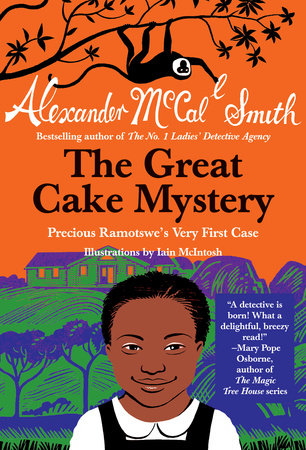The Great Cake Mystery: Precious Ramotswe’s Very First Case Reader’s Guide
By Alexander McCall Smith


A: DISCUSSION QUESTIONS
1. Do you agree with the author’s statement that detectives are “born that way”?
2. Why does the author stress that Precious is a “nice” person? What personality traits do you think a nice person should possess?
3. Discuss the significance of Obed’s story about the lion. What does it tell Precious about her father? Why does she like to hear the story over and over?
4. How does Precious know which parts of the lion story are true and which parts are stretching the truth? Why is this important?
5. Why does Tapiwa tell Precious about the cake thief? Why does she assume that the thief is someone in the school?
6. Precious wonders if people who grow up to steal were thieves when they were children or if they became thieves later on. This question is not answered in the book. What do you think?
7. Why does everyone like Sepo? What qualities does he have that make him popular with the other students?
8. Why do Sepo and Tapiwa believe that Poloko is the thief? What evidence do they have? Why are the other children so quick to believe that Poloko is the thief?
9. How does Poloko feel when the others accuse him of stealing the food? How would you feel if you were accused of something that you didn’t do? Why is it so hard for Poloko to defend himself?
10. Why does Precious believe Poloko is innocent? Why does she tell him she will be his friend when everyone else believes the worst about him?
11. How do Precious and Poloko discover the real thieves? If they had not walked home from school together, taking their time, would they have solved the mystery?
12. Solving the mystery is one thing, but the real challenge is proving it to the others. How does Precious convince the other children and the teacher of the truth? How does her dream help her trap the real thieves?
B: POST-READING ACTIVITY
1. Discuss the theme of honesty in this story. What does honesty mean to you? Can you think of other ways that Precious might have proven to the class that Poloko was innocent?
2. Discuss the theme of friendship in this story. Who acted as a true friend? What qualities do you look for in a friend? How can you tell when someone is a true friend?
3. Discuss the theme of stereotypes and what it means to judge people based on preconceived notions rather than evidence. Discuss the need to hear all sides of a story before you accuse a person of wrongdoing.
C: CIRRICULUM QUESTIONS
1. Geography:
Draw a map of Africa and highlight the country of Botswana on the map. Locate the countries that are near Botswana on the map. What more do you want to know about Botswana after reading The Great Cake Mystery? http://www.botswanatourism.co.bw/
2. Science/Biology—The Animal Kingdom:
Find information about the indigenous monkeys in Botswana. How does this information help you understand the story better? http://www.wildlife-pictures-online.com/vervet-monkey-information.html
3. Language Arts:
Write a character sketch of your favorite character in the story. What do you think that character does in his or her spare time? What is your character’s family like? Write a story of your own that includes the character you have chosen. Look up information about the author of The Great Cake Mystery: http://www.randomhouse.com/features/mccallsmith/main.php
4. Social Studies:
In the American judicial system, an accused person is “innocent until proven guilty.” Discuss the meaning of this phrase. Research the history of the American Bill of Rights and how it came to be adopted by our Congress: http://www.americaslibrary.gov/jb/nation/jb_nation_bofright_1.html
How do the laws of Botswana compare to the American system?
Just for joining you’ll get personalized recommendations on your dashboard daily and features only for members.
Find Out More Join Now Sign In